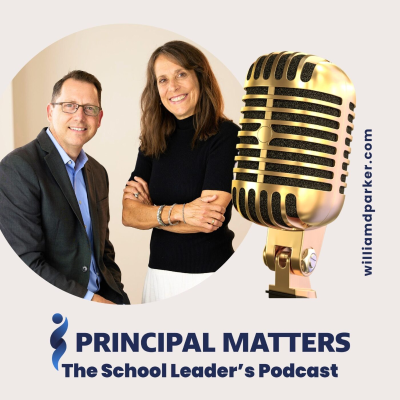
Principal Matters: The School Leader's Podcast with William D. Parker
engelsk
Videnskab & teknologi
Begrænset tilbud
1 måned kun 9 kr.
Derefter 99 kr. / månedOpsig når som helst.
- 20 lydbogstimer pr. måned
- Podcasts kun på Podimo
- Gratis podcasts
Læs mere Principal Matters: The School Leader's Podcast with William D. Parker
With William D. Parker and Friends
Alle episoder
621 episoderPMP490: Rural School Leadership with Eric Nichols
Some people have begun to refer to Dr. Eric Nicols as “The Rural School Leader,” and no wonder. Dr. Nichols has dedicated his career to championing the students and communities of rural Eastern Oregon. Serving as both Principal and Head Boys’ Basketball Coach at Crane Union High School, one of the nation’s last public boarding schools, he has embraced the multifaceted leadership required in isolated educational environments. Driven by his own small-town upbringing, Dr. Nichols has not only led his basketball team to four consecutive state championships, forging deep community bonds, but has also significantly enhanced academic offerings through expanded Career and Technical Education (CTE) programs. A passionate advocate who understands that rural schools are the “hubs” of their communities, he co-founded “Wide Open Spaces,” a professional network to combat the isolation of rural educators, embodying his mission to ensure these vital institutions receive the recognition and resources necessary to thrive. This episode of Principal Matters Podcast features Dr. Jen Schwanke in conversation with Dr. Eric Nichols, who is celebrated as a champion for students and educators in rural communities. Jen met when Dr. Nichols invited her to present at a 2-day rural conference in beautiful Bend, Oregon, an event he co-founded to connect educators across the state. Dr. Nichols currently serves as the principal and head boys basketball coach at Crane Union High School, where he advocates for the belief that the school is the primary hub of its small town community. During their discussion, Dr. Nichols recounts his path to rural leadership, the unique structure of his public boarding school, the origin of his networking initiative for isolated educators, and the importance of fostering deep community connections. He emphasizes that moving to rural life was a choice he made, noting that “rural isn’t something that happens to you. It’s something you get to be a part of.” You can find Dr. Nichols on X and Instagram at @iamericnichols. You can also find him on LinkedIn [https://www.linkedin.com/in/eric-nichols-046597176]. Learn a bit more about Dr. Nichols in this feature article [https://iamaruralteacher.org/stories/eric-nichols-crane-or]. The post PMP490: Rural School Leadership with Eric Nichols [https://williamdparker.com/2026/pmp490-rural-school-leadership-with-eric-nichols/] appeared first on Principal Matters [https://williamdparker.com].
MONDAY MATTERS with Jen Schwanke and Will Parker – Tips for Interviewing
Welcome back to another episode of Monday Matters! This week, Jen Schwanke and I are talking about interview tips for educators. We share practical interview tips and tell some stories about times that interviews did not go well for us. Today’s topic was inspired by one of Jen’s recent newsletters, you can read it here [https://jen-newsletter-c4287d.beehiiv.com/p/interviewing?utm_source=jen-newsletter-c4287d.beehiiv.com&utm_medium=newsletter&utm_campaign=interviewing&_bhlid=e14e594d7945e7cc521987b10cf808737862f8b5&jwt_token=]. You can also read some of my older posts on interviewing here [https://williamdparker.com/2019/pmpencore027-ten-tips-for-interviewing-for-an-education-opening-2/] and here [https://williamdparker.com/2015/30-questions-from-principal-interviews-plus-more/]. Listen in to hear the full conversation! The post MONDAY MATTERS with Jen Schwanke and Will Parker – Tips for Interviewing [https://williamdparker.com/2026/monday-matters-with-jen-schwanke-and-will-parker-tips-for-interviewing/] appeared first on Principal Matters [https://williamdparker.com].
ENCORE FRIDAY – PMP412: The Principal’s Journey with Dr. Rachel Edoho-Eket
For the final Friday of Black History Month, the exceptional educator highlighted this week is Dr. Rachel Edoho-Eket. [https://williamdparker.com/wp-content/uploads/2026/02/rachele.jpg] She is a wife, mother, principal, public speaker, and author, and has decades of experience in public education. During her educational career, she has proudly served as a classroom teacher, instructional team leader, mentor teacher, Assistant Principal, and Principal. In this interview, she talks with me about her book The Principal’s Journey: Navigating the Path to School Leadership [https://www.amazon.com/Principals-Journey-Navigating-School-Leadership/dp/B0BVC8MXNB]. Visit her website here [https://bio.site/the_principals_journey]. Listen in to hear the full conversation! You can visit the original blog pos [https://williamdparker.com/2024/pmp412-the-principals-journey-with-dr-rachel-edoho-eket/]t to learn even more about Dr. Edoho-Eket. The post ENCORE FRIDAY – PMP412: The Principal’s Journey with Dr. Rachel Edoho-Eket [https://williamdparker.com/2026/encore-friday-pmp412-the-principals-journey-with-dr-rachel-edoho-eket/] appeared first on Principal Matters [https://williamdparker.com].
PMP489: Leading with Heart and Strategy with Blaine Wise
A QUICK NOTE TO LISTENERS: Before this week’s interview, Will Parker and Jen Schwanke take some time to answer a listener question. This week’s question is particularly loaded, so it will be answered in two parts, with part two coming out next week. The question is: I’m a longtime listener and am reaching out because I’m struggling with burnout. I’d love to hear how you’ve navigated the most difficult stretches of your career. What helped you persevere? Are there particular podcast episodes or conversations you’d recommend for someone trying to regain perspective and resilience? Listen in to hear their response! MEET BLAINE WISE: Blaine Wise is a passionate and dedicated educational leader with 17 years of experience in Oklahoma public schools. Since 2021, he’s served as principal of Glenpool Middle School, where he’s led with purpose, building a high-performing, positive school culture that’s earned statewide recognition. In 2025, he was named the OASSP/OMLEA Middle Level Principal of the Year. Blaine began his career as a classroom teacher at Glenpool High School, later serving as a teacher and assistant principal at Charles Page High School and Charles Page Freshman Academy. With a strong foundation in instruction and leadership, he leads with both heart and strategy. He holds a bachelor’s degree from Haskell Indian Nations University and a master’s from Southern Nazarene University. Known for his collaborative, student-centered approach, Blaine serves in multiple leadership roles through CCOSA, OMLEA, and NASSP—including as OASSP President-Elect. In 2025, he launched his website to share actionable leadership strategies that ignite purpose in educators and inspire excellence in students. Blaine Wise leads with gratitude, models excellence, and is committed to supporting students, staff, and the broader school community. INTERVIEW TAKEAWAYS: Blaine Wise’s journey into the profession began unexpectedly after a closed door to a job opportunity opened the door to teaching. A proud member of the Seminole Nation, Blaine holds a Bachelor of Arts in American Indian Studies. He initially explored career paths with that degree outside of education. However, once he began teaching, he found his calling and has never looked back. Blaine believes that effective leadership requires a strong commitment to building and sustaining school culture. He emphasizes that culture does not happen by accident—it must be intentional and consistently cultivated through daily interactions and leadership practices. * Culture is intentional. It is shaped through the way leaders conduct meetings, interact with staff, and communicate one-on-one. * Leadership interactions matter. “We can’t control how people feel, but we’re responsible for how we interact with them,” he explains. * A guiding principle: Support in public and correct in private. When offering advice to new leaders, Blaine highlights the importance of humility, action, and collective wisdom: * Build a trusted network of mentors for guidance and support. * Remember, “It’s not your school—it’s our school.” * Take action on good ideas; leadership is both a privilege and a responsibility. * “The smartest person in the room is the room”—use collective knowledge to guide decisions. * Learn through trial and error, and commit to intentional reflection. * Share school-wide plans and maps in advance to foster clarity and trust. For veteran leaders, Blaine encourages replacing the word motivated with inspired or committed. He believes staying inspired comes from returning to cycles of reflection and remembering why you lead in the first place. * Take time to pause before making major decisions. * Revisit your “why” by being the kind of teacher and principal you once needed. * Protect your time for thoughtful decision-making by sometimes closing the door or asking for a moment to think. Blaine draws inspiration from other educational leaders, including Baruti Kafele, and continually asks himself, “Is my school better because I lead it?” He even wears a whistle daily to remind himself that, at his core, he is the coach of his school. In addition to his work as a principal, Blaine shares leadership insights through his website [https://blainewise.com/]. He also loves to speak to schools and welcomes opportunities to collaborate with other leaders. The post PMP489: Leading with Heart and Strategy with Blaine Wise [https://williamdparker.com/2026/pmp489-leading-with-heart-and-strategy-with-blaine-wise/] appeared first on Principal Matters [https://williamdparker.com].
MONDAY MATTERS with Jen Schwanke and Will Parker – Stretching Students Beyond the Test
This week’s Monday Matters episode is a longer response to a listener question covered in the Q&A portion of Principal Matters Podcast. The question is: > “As a system leader, how do you encourage teachers in high-performing schools to go beyond “my students do well on the tests” or even other administrators, “have you seen our test scores?” and aim for instruction that really stretches students’ thinking, agency, and intellectual rigor? I’m especially curious how you do this when current success metrics and evaluations tend to reinforce the status quo.” – Cat Stathulis, Westerville, Ohio In response to Cat’s question about how to push high-performing schools beyond strong test scores toward deeper intellectual rigor, Will and Jen’s conversation is centered on redefining what “rigor” really means. First, leaders must remember the realities of the teenage brain. Students have limited cognitive and emotional stamina. A student can perform well on a test yet still need structured opportunities to build endurance for extended thinking. High scores do not automatically equal deep learning. Second, rigor does not require more assignments or heavier workloads. It often happens through better conversation. Simple questions like “What are you thinking?”, “Tell me more,” and “Why?” can stretch thinking far more effectively than additional worksheets. Dialogue itself can deepen learning. The discussion also emphasized being intentional about levels of questions on tests. Teachers should plan questions at three levels: * Level 1: Facts and recall (Do students understand the material?) * Level 2: Interpretation and analysis (Can they connect and explain ideas?) * Level 3: Application (Can they use and transfer what they know?) Deep learning frequently operates at Levels 2 and 3 — and that depth does not always show up immediately on standardized tests. Another key measure of success is readiness. Beyond scores, leaders should ask: Are students prepared for what comes next — academically, intellectually, and personally? Finally, teachers themselves must stretch. Thoughtful teaching sharpens not only student thinking but also teacher clarity about what students truly understand. Big takeaway: Rigor isn’t about more work or higher test numbers. It’s about intentional questioning, intellectual stretch through conversation, and preparing students for the next stage of life — even when that growth isn’t easily measured. RESOURCES FOR FURTHER LEARNING: In addition, Jen and Will discussed two resources from previous podcast guests that unpack practical ways for educators to go deeper in their own teaching practices as well as in student learning. Listen in to the entire podcast conversation for more, and check out these resources and previous guests. PMP177: Cha Cha’s for Making Learning Stick with LeAnn Nickelsen [PMP177: Cha Cha’s for Making Learning Stick with LeAnn Nickelsen] PMP420: Mentoring Mindset with David Yeager [PMP420: Mentoring Mindset with David Yeager ] The post MONDAY MATTERS with Jen Schwanke and Will Parker – Stretching Students Beyond the Test [https://williamdparker.com/2026/monday-matters-with-jen-schwanke-and-will-parker-stretching-students-beyond-the-test/] appeared first on Principal Matters [https://williamdparker.com].
Vælg dit abonnement
Begrænset tilbud
Premium
20 timers lydbøger
Podcasts kun på Podimo
Gratis podcasts
Opsig når som helst
1 måned kun 9 kr.
Derefter 99 kr. / måned
Premium Plus
100 timers lydbøger
Podcasts kun på Podimo
Gratis podcasts
Opsig når som helst
Prøv gratis i 7 dage
Derefter 129 kr. / måned
1 måned kun 9 kr. Derefter 99 kr. / måned. Opsig når som helst.















































